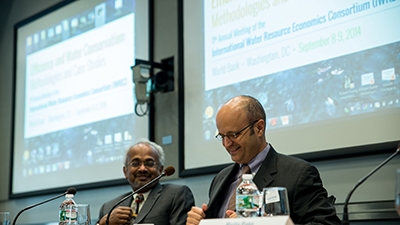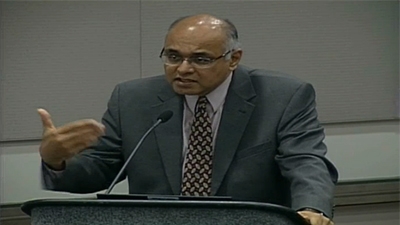Given the challenges facing the water sector, ranging from increased competition for scarce resources to increasing water pollution and climate change to an unfinished agenda of providing basic water services for the poor, a recent conference hosted at the World Bank in Washington, D.C. brought together water economists and development practitioners to focus on some of these pressing issues.
The conference, the 11th annual meeting of the International Water Resource Economics Consortium (IWREC), on September 7-9, 2014 brought together the richness of economic research from around the world in the discussion of key water challenges. IWREC has served as a platform for water economists to promote economic work on water resources and exchange information and research findings since the early 1990s. The conference program included 50 presentations, on topics ranging from agricultural and municipal water use to groundwater management, hydroeconomic modeling and broader welfare implications of water interventions.
The presentations also shared the most recent investigations into how economic incentives influence people's water-related choices.
“Those incentives are important, and failure to take them into account has and will continue to encourage inefficient and inequitable water use,” said John Janmaat, Associate Professor of Economics at the University of British Columbia and Chair of IWREC. “However, the variety of investigations also highlights the importance of context. Overlooking the context within which incentive-based policies are to operate may lead to unintended results, if these changes can even be effected,” Janmaat added.
Moving the dialogue forward on water pricing
Following two days of presentations and rich discussion, six chief economists of the World Bank outlined challenges that they face either in their region or across the Bank. Among the issues raised was how to move forward the dialogue on water pricing, given the ongoing debate about price reform and implementation.
As World Bank Group, Senior Director of the Water Global Practice, Junaid Ahmad said, “Pricing of water remains a contentious issue. Yet, we are learning that underpricing water often brings it into the realm of rent seeking and politics, leaving the poor outside the ambit of service delivery. On the other hand, managing water as an economic good is an important way of achieving more efficient and equitable use, and of promoting the protection of water resources."
Other issues concerned the difficulty in clarifying property rights for many types of water uses, managing the political economy, and making more informed decisions on transformational interventions that are often associated with tremendous uncertainties.



